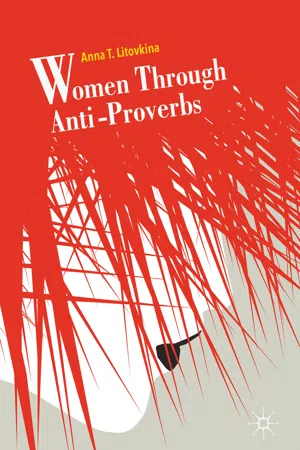1.1 Introduction
Even a cursory glance at any
collection of the proverbs
of various nations reveals many striking
similarities among the proverbs about women (in particular, wives,
mothers, young
girls, mothers-in-law,
spinsters, and
widows). Many of them, no matter from which culture, are almost identical in meaning and
wording, and devalue, discriminate and undermine women. Let the proverbs below speak for themselves:
Girls are beautiful, sweet and tender; where do all those wicked wives come from? (Russian)
Woman is more wicked than the Devil (Bulgarian)
As long as she is with her mother, kind as a lamb; as soon as she has got a husband, she pulls out a long tongue (Serbian/Croatian)
Mother -in-law, daughter -in-law: dog and cat never eat from the same plate (Spanish, Chile; Italian)
A bad wife ruins a family (Chinese)
From a garment flutters a moth and from a woman her wickedness; better the wickedness of a man than a woman’s virtue (Hebrew)
There is only one wicked wife and every man supposes he has got her (Dutch)
One could also draw from such compendia as Thiselton-Dyer’s Folk-Lore of Women as Illustrated by Legendary and Traditionary Tales, Folk-Rhymes, Proverbial Sayings, Superstitions, etc. (1905) in our discussion: There are only two good women in the world: one of them is dead, and the other is not found (German) and All women are good … good for something, or good for nothing (English). As many contemporary studies have also pointed out, proverbs about women, irrespective of their country and tradition, contain sexism and antifeminism (on women in American proverbs, see Kerschen 1998 and Rittersbacher 2002; on women in Polish proverbs, see Perlinska 1996; on women in Yoruba proverbs, see Daniel 2008, and Yusuf 1995, 1997, 1999; on women in Turkish proverbs, see Kansu-Yetkiner 2006; on women, sex, and marriage in Moroccan proverbs, see Webster 1982; on women in Irish and other proverbs, see Williams 1984; and on women in proverbs from around the world, see Schipper 2003).
American culture is not different with regard to the proverbial treatment of women. Let us have a look at just a few examples expressing prevailing negative attitudes toward women: A woman’s place is in the home ; A woman, a dog and a walnut tree: the more you beat them, the better they be; When a man takes a wife , he ceases to dread hell; Women are the root of all evil ; Women are saints in church , angels in the street, devils in the kitchen , and apes in bed ; A whistling girl and a crowing hen always come to no good end (for more, see Kerschen 1998; Mieder et al. 1992).
The following ten sections of this chapter discuss how women are reflected in American proverbs. While the focus of Sect. 1.2 is proverbs about women in general, Sects. 1.3, 1.4, 1.5, 1.6, 1.7, 1.8, and 1.9 explore how the image of women in various roles is projected in proverbs. Section 1.3 examines proverbs about young women, such as girls, daughters, and brides, while Sect. 1.4 focuses on proverbs about spinsters. Section 1.5 addresses proverbs about wives. Section 1.6 deals with proverbs about widows and Sect. 1.7 with proverbs about mothers. Section 1.8 focuses on proverbs about mothers-in-law, while Sect. 1.9 addresses proverbs about old women in general. Finally, Sects. 1.10 and 1.11 study proverbs about various aspects of female sexuality, and in particular two common female occupations emerging in proverbs: housewife and whore.
The vast majority of the proverbs quoted and discussed in this chapter are taken from Mieder et al. 1992 and Kerschen 1998; furthermore, a number of dictionaries of American proverbs have also been consulted (Bertram 1994; Stevenson 1948; Taylor and Whiting 1958; Titelman 1996; Whiting 1977, 1989). It has to be pointed out here that many of these proverbs were recorded in only one state of the USA , and are not known any longer.
1.2 Women in General
In this section we examine the stereotypical traits of women according to American proverbs.
Having a strong will, women persistently try to get their way and, therefore, whenever they can, they exercise their power and dominance over men, as countless proverbs point out: Two things govern the world—women and gold; While there’s a world, it’s a woman that will govern it; Man has his will, but woman has her way. The power of women should always be taken into account: Never underestimate the power of women. It is women—and not men—who always have their way: Women will have both her word and her way. Indeed, A man thinks he knows, but a woman knows better. Women’s most outstanding and dangerous power over men is their sexual attractiveness and beauty: One hair of a woman draws more than a team of oxen; It takes twenty-one years for one woman to make a man of her son , it takes twenty-one seconds for another woman to make a fool of him. Women can fool even the wisest man in a second: Any wise man can be fooled by a foolish woman....




